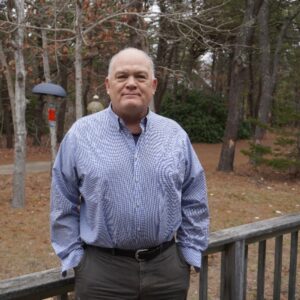EASTHAM — Select board candidate Brian Earley was the only member of the planning board to vote against recommending the zoning task force’s proposed amendments for the North Eastham Corridor district at the board’s public hearing on March 19. “I thought it was a good plan, maybe a bit pie-in-the-sky,” he says, “but I was hoping for a market solution to all that.”

Earley is a military veteran who moved to Eastham in 1995. He retired from the Army in 2005 after serving for 23 years — seven on active duty, 16 in the reserves — in Europe and the Americas. He says he was inspired to run for the select board this year when another candidate came to the planning board in search of signatures for nomination papers.
Earley says that he hopes to bring stability to the select board in what he sees as a time of economic uncertainty. “We’ve had a really rocky time, not so much on the municipal level but on the levels above — certainly on the state level,” he says. “We ought to live in an American system, which we had, but then we kind of got away from.”
The American System, Earley says, is characterized by a focus on credit, investment, and infrastructure. Tariffs are another hallmark of the American System (also known as the American School), which was popular in the U.S. during the late 19th and early 20th centuries.
What would it mean for Eastham to return to the American System? “Hopefully, that would result in less taxes,” Earley says. “But as a select board member, I’d have just one vote out of five, so it’s not always an easy thing to say. Our government is designed to move slowly but deliberatively.”
Earley says that the biggest issues facing Eastham right now are the cost of living and the tax rate. “It shouldn’t be as expensive as it is,” he says. “It used to be relatively easy to find an inexpensive place to stay, but that’s not the case anymore. It’s why there are so many homeless people today, and that’s a real sin and a crime. We ought to be taking care of our less fortunate — the elderly, people who haven’t been able to work, people who are living on the streets.”
Earley says he has mixed feelings on the residential tax exemption, which the select board plans to implement for fiscal 2026 to lighten the tax burden on year-round residents. “In general, I want to support exemptions, but I also support a uniform tax code,” he says. “My gut says yes, but you never quite know.”
Earley also says he supports the petitioned Article 9A on the town meeting warrant, which seeks an independent auditor to examine the town’s tax structure before any changes are made. He says his appreciation of audits comes from speaking with his college roommate, who was involved in an audit of the Pentagon. “He couldn’t solve all the problems, but at least he made the numbers match for a year,” Earley says.
Making the numbers match is an important part of Earley’s platform. He questions the reasons for the town’s gradually increasing tax rate, particularly in connection with the upcoming wastewater project. Of the project’s anticipated $160-million price tag, he says, “You have to look at the numbers real hard and say, ‘Is that money going to go to actually reducing the wastewater?’ ”
Some budget items would require more careful consideration before losing funding, Earley says, including “fire, the police, and any of the municipal services.” But, he says, he hopes to “slowly, over time,” work to reduce taxes related to those services. “But it’s not going to happen dramatically unless something happens on the bigger level,” he says.
Earley’s other hopes for Eastham include the creation of more farmland to diversify the town’s economic capabilities, possibly by borrowing land from the National Seashore to use for agriculture. “I’m sure they’d do that, given their statutes,” he says. “Pine trees are kind of boring.”



